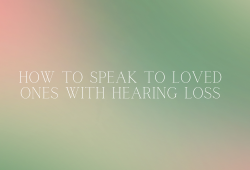Surprised By What Causes Dizziness?
Have you ever suddenly felt like the room is spinning? Have you needed to stop and grab onto a nearby object to maintain your balance? Have you wondered what causes dizziness? Nearly half of all people will go to his or her healthcare provider at some point with concerns of dizziness. Do you know what causes dizziness? With dizziness being such a prevalent condition, having the appropriate avenues to properly diagnose and treat dizziness is important. Fortunately, we at Levine Hearing can help answer what causes dizziness in your particular case and how to best treat it.
What is dizziness?
Dizziness can present itself in many different ways. You may feel like the room is spinning, which is what we describe as vertigo, or you may feel off-balance and unsteady on your feet. Sometimes the symptoms can last for just a few seconds, but in some cases, they can last for several days at a time. Regardless of how dizziness feels to you, it is important to have it checked by a healthcare professional to learn more about what causes dizziness and what can be done to manage it.
What causes dizziness?
Dizziness can originate from multiple parts of the body including the eyes, the feet, or the brain, but a lot of times dizziness stems from the ears! Deep in the inner portion of each of your ears lies five components of your balance system: a utricle, a saccule, and three semicircular canals. Each of these organs plays a critical role in keeping you steady through both linear movements (i.e. riding in a car) and rotational movements (i.e. turning your head or bending over). If any one of these components is compromised, a person may begin to experience dizziness. Perhaps the most commonly recognized form of dizziness is true vertigo in which crystals from the inner ear get stuck in the semicircular canals and cause a person to feel a spinning sensation when bending over or rolling over in bed. As you learn more you may see that what causes dizziness may range from ear infections to medications to cardiovascular issues.
What can we do to help treat dizziness?
The first step in treating dizziness is a visit to your audiologist. Doctors of audiology specialize in the diagnosis and treatment of hearing and balance disorders, and they play a critical role in determining the root cause of your dizziness. Your audiologist will begin with a complete examination of your ears which includes a thorough hearing test. Sometimes clues about your dizziness can be found in the hearing test! Following the hearing test, we can move to a series of diagnostic tests that isolate the portion of your ear that is responsible for balance. Finding out what causes dizziness in your specific case can guide your audiologist to make the best recommendations and referrals to treat and manage your dizziness. Treatments for dizziness will vary based on the type and origin of your dizziness and may include medications, lifestyle changes, or vestibular rehabilitation.
What can I do at home to prevent falling?
If you or someone you know experiences dizziness, one of the most important things to do is make sure you are reducing the risk of falling. Learning about what causes dizziness is important but reducing other physical risk factors in your home is an important step as well.
Keep a well-lit environment. Seeing your surroundings and improving spatial awareness will help reduce the risk of falling. Using nightlights can be especially helpful in case you find yourself needing to get up in the middle of the night.
Reduce clutter on the floor. Removing unnecessary items such as extra cords, throw rugs, and other household items will reduce the likelihood of tripping.
Change positions slowly. If quick movements are a known cause of your dizziness, slow down! Take a minute to gather yourself before standing up from a chair or bed.
Hold onto nearby objects to maintain balance. Sometimes dizziness can hit unexpectedly, so make sure you hold onto handrails when going up or down stairs, use hand grips when stepping into the shower, and consider using a cane or walker to maintain balance when walking around.
If you or someone you know is experiencing dizziness, contact the ear experts at Levine Hearing to see how we can help!




